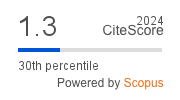Antitumor activity of antisense oligonucleotide p45Skp2 in soft palate carcinoma cell squamous in vitro
Downloads
Background: Human soft palate cancers are characterized by a high degree of local invasion and metastasis to the regional lymph nodes. Treatment options for this cancer are limited. However, a new strategy for refractory cancer, gene therapy is watched with keen interest. p45Skp2 gene as a tumor promoter gene is one of target of the oral cancer therapy. To inhibit the activity of p45Skp2 gene is carried-out the genetic engineering via antisense technique. Purpose: To examine the antitumor activity of p45Skp2 antisense (p45Skp2 AS) gene therapy in human soft palate [Hamakawa-Inoue (HI)] cancer cells. Methods: Pure laboratory experimental study with post test only control group design was conducted as a research design. To investigate the apoptosis induction of p45Skp2 AStransfected cell was evaluated by colorimetric caspase-3 assay and Flow cytometry. Furthermore, to detect the suppression of in vitro HI cell invasion and cell growth of p45Skp2 AS-treatment cell was examined by Boyden chamber kit and MTT assay, respectively. Results: The cell number of p45Skp2 AS-treated HI cell was significant decreased when compared with that of p45Skp2 sense (p45Skp2 S) cells (p<0.05). p45Skp2 AS-treated cell induced apoptosis characterized by an increase in the early and late apoptosis, and activation of caspase-3 (p<0.05). Therefore, suppression of HI cell invasion and cell growth were markedly increased by p45Skp2 AS treatment (p<0.05). Conclusion: Antisense oligonucleotide p45Skp2 has a high antitumor activity in human soft palate cancer cell, targeting this molecule could represent a promising new therapeutics approach for this type of cancer.
Latar belakang: Kanker palatum lunak mempunyai karakteristik invasi dan metastasis ke limfonodi regional yang tinggi. Pilihan perawatan kanker tersebut masih sangat terbatas. Walaupun demikian, strategi baru untuk penanganan kanker yaitu terapi gen menjadi pilihan utama. Gen p45Skp2 sebagai gen pemacu tumor merupakan salah satu target terapi kanker oral. Untuk menghambat aktivitas gen p45Skp2 tersebut dilakukan rekayasa genetik melalui teknik antisense. Tujuan: Menguji aktivitas antitumor gen p45Skp2 antisense (p45Skp2 AS) terhadap sel kanker palatum lunak (sel HI). Metode: Jenis penelitian yang digunakan adalah eksperimen laboratorik murni dengan rancangan posttest only control group design. Induksi apoptosis sel yang ditransfeksi p45Skp2 AS dievaluasi menggunakan uji caspase-3 kolorimetrik dan flow cytometry. Untuk mendeteksi hambatan invasi dan pertumbuhan sel HI yang ditransfeksi p45Skp2 AS dilakukan uji Boyden chamber dan uji MTT. Hasil: Pertumbuhan sel HI yang ditransfeksi p45Skp2 AS menurun secara signifikan dibandingkan dengan p45Skp2 Sense (S) (p<0,05). Sel HI transfeksi p45Skp2 AS menginduksi apoptosis dengan meningkatkan aktivitas proteolitik caspase-3 dan early and late apoptosis (p<0,05). Hambatan invasi dan pertumbuhan sel HI secara signifikan meningkat pada sel yang diperlakukan dengan p45Skp2 AS (p<0,05). Kesimpulan: p45Skp2 AS oligonukleotida mempunyai aktivitas antitumor yang kuat pada sel kanker palatum lunak. Target dari molekul tersebut dapat menjanjikan suatu terapeutik baru untuk jenis kanker palatum tersebut.
Downloads
- Every manuscript submitted to must observe the policy and terms set by the Dental Journal (Majalah Kedokteran Gigi).
- Publication rights to manuscript content published by the Dental Journal (Majalah Kedokteran Gigi) is owned by the journal with the consent and approval of the author(s) concerned.
- Full texts of electronically published manuscripts can be accessed free of charge and used according to the license shown below.
- The Dental Journal (Majalah Kedokteran Gigi) is licensed under a Creative Commons Attribution-ShareAlike 4.0 International License

















